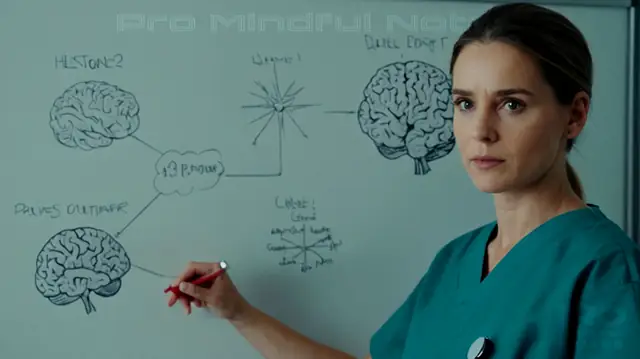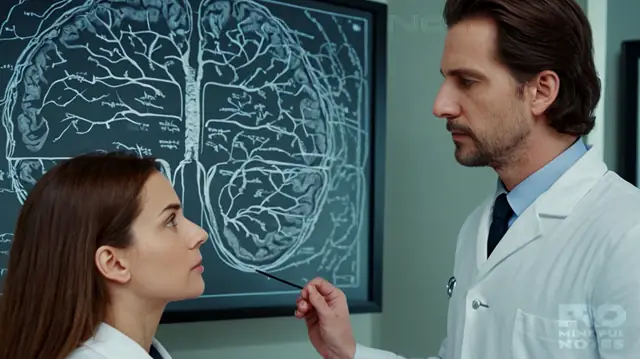Unlock expert-level MSE skills with our definitive mental status exam guide

In this article, we'll be diving into the world of mental health assessments and exploring the intricacies of conducting a comprehensive Mental Status Exam (MSE). The MSE is a vital tool for healthcare professionals, social workers, and counselors alike, providing a holistic understanding of an individual's cognitive, emotional, and behavioral functioning at a specific point in time. With our definitive guide, you'll learn how to unlock expert-level skills and become proficient in administering the MSE.
To get started, we'll be sharing a MSE Checklist, outlining the essential domains and principles to cover during the examination. This comprehensive resource will walk you through the process of setting the stage for a comfortable and respectful assessment, assessing cognitive functioning, emotional and affective processes, behavioral observation, and insight and judgment. By the end of this article, you'll have at your fingertips a Mental Status Exam Cheat Sheet that will serve as a valuable reference guide for years to come.
Whether you're a seasoned professional or just starting out in the field of mental health, our definitive guide is designed to help you master the MSE and enhance your clinical skills. So, let's get started on this journey to expert-level MSE skills, and discover how our Mental Health Status Exam Cheat Sheet can become an indispensable tool in your professional toolkit.
- Setting the stage: establishing comfort, privacy, and respect
- Cognitive functioning: attention, memory, language, and problem-solving
- Emotional and affective processes: mood, emotional tone, and reactivity
- Behavioral observation: appearance, posture, and mannerisms
- Insight and judgment: self-awareness and decision-making
- Putting it all together: conducting a comprehensive MSE
- Tips for improving your MSE skills
- Common mistakes to avoid when administering the MSE
- Conclusion
- Video about Unlock expert-level MSE skills with our definitive mental status exam guide
Setting the stage: establishing comfort, privacy, and respect

As you begin conducting a Mental Status Exam (MSE), it is crucial to set the tone for a productive and comfortable interaction. A well-established rapport can make all the difference in obtaining accurate information from your client or patient. To achieve this, follow these essential steps:
Firstly, ensure comfort by creating a relaxed atmosphere. This might involve adjusting the physical environment, such as lighting or seating arrangements, to accommodate any needs or preferences. Additionally, consider providing water or other refreshments if necessary. The goal is to help your client feel at ease, which will ultimately facilitate a more honest and open assessment.
Next, prioritize privacy by ensuring that the individual feels safe and secure during the examination. This may involve finding a private space for the MSE or using visual barriers such as screens or partitions. Remember that maintaining privacy not only promotes trust but also respects your client's autonomy.
Finally, demonstrate genuine respect for your client's experience, values, and perspectives. As you begin the MSE process with your MSE checklist or MSE cheat sheet, approach each section with empathy and curiosity. This may involve active listening skills, such as maintaining eye contact, nodding, or summarizing what they share. By establishing a connection built on trust, understanding, and compassion, you lay the groundwork for an effective MSE that yields valuable insights into your client's mental health status.
By setting the stage correctly, you will be better equipped to conduct a comprehensive Mental Status Exam using your mental status exam cheat sheet or mental health status exam cheat sheet. This foundation of comfort, privacy, and respect will ultimately guide your assessment, allowing you to gather crucial information that informs diagnoses and treatment plans.
Cognitive functioning: attention, memory, language, and problem-solving

The MSE cognitive functioning assessment is a critical component of the overall mental status examination. It provides valuable insights into an individual's ability to process information, retain memories, communicate effectively, and solve problems. Using your MSE checklist, assess the patient's level of attention by asking them to follow simple instructions or perform a task that requires focus. Note any distractions or difficulties they experience.
Next, evaluate the patient's memory by asking them to recall specific events, names, or dates. Use your mental status exam cheat sheet to guide you through this process, and note any inconsistencies in their responses. Additionally, assess their language abilities by engaging them in conversation, paying attention to clarity, coherence, and tone. Finally, conduct a simple problem-solving task to gauge the patient's ability to think critically and make decisions.
When evaluating cognitive functioning, it is essential to be thorough and detailed. Use your MSE cheat sheet as a guide to ensure you are covering all necessary areas. Remember that cognitive impairments can have significant implications for daily life, making it crucial to identify any potential issues early on. By incorporating these assessments into your mental status examination, you will gain valuable insights into the patient's overall mental health and well-being.
Emotional and affective processes: mood, emotional tone, and reactivity
When conducting an MSE, it's essential to assess the individual's emotional state and their reaction to different situations. This can be achieved through open-ended questions, observational notes, and behavioral ratings. In this section of the mental status exam cheat sheet, consider exploring the individual's mood, which refers to their overall emotional tone. Are they calm, anxious, or irritable? Take note of any fluctuations in mood throughout the examination.
The MSE checklist can also help you gauge the individual's emotional reactivity, or how they respond to different stimuli. For instance, do they become agitated when discussing a specific topic or remain composed under pressure? This information can provide valuable insights into their emotional regulation and coping mechanisms. By incorporating these aspects of emotional and affective processes into your mental status exam cheat sheet, you'll gain a more comprehensive understanding of the individual's mental health status.
In addition to assessing mood and reactivity, it's crucial to examine the individual's emotional tone, which refers to their characteristic emotional atmosphere or "flavor." Are they typically optimistic, pessimistic, or neutral? This can help you identify patterns in their emotional experiences and how these might impact their daily life. By incorporating these elements into your mental health status exam cheat sheet, you'll be better equipped to conduct a thorough MSE that provides valuable insights for diagnosis, treatment planning, and ongoing care.
Behavioral observation: appearance, posture, and mannerisms

When conducting the Mental Status Exam (MSE), it's crucial to observe an individual's behavioral cues during your interaction. This includes their appearance, which can provide valuable information about their overall health and hygiene habits. Observe if they have any visible signs of illness or injury, such as rashes, cuts, or scars.
During the MSE, pay attention to a person's posture and body language. Are they sitting comfortably with open gestures or do they appear rigid and tense? Note whether their eyes meet yours during conversation, and if so, for how long. This can indicate trustworthiness or evasiveness. As you interact with the individual, take note of their mannerisms, such as fidgeting, tapping their feet, or adjusting their clothing. These subtle behaviors can reveal underlying anxiety levels, nervousness, or even aggression.
To help you effectively document these observations during the MSE, we've included a comprehensive checklist in our Mental Status Exam Cheat Sheet and Checklist (MSE Cheat Sheet). This valuable resource provides templates for recording behavioral observations, ensuring that no important detail is overlooked. By using this guide, you'll be well-equipped to conduct a thorough MSE assessment and provide accurate information about an individual's mental status.
Remember, the MSE is a crucial component of any mental health assessment or clinical contact. With our Mental Status Exam Cheat Sheet (MSE) and checklist, you'll be able to confidently assess a person's cognitive, emotional, and behavioral functioning at a specific point in time.
Insight and judgment: self-awareness and decision-making

When it comes to conducting a Mental Status Exam (MSE), insight and judgment are crucial domains to assess. Insight refers to an individual's ability to recognize their own thoughts, feelings, and behaviors, while judgment encompasses the capacity to make sound decisions. During the MSE, the examiner aims to evaluate the patient's level of self-awareness by asking questions that promote introspection and encourage them to reflect on their experiences.
In this section, use the MSE checklist or mental status exam cheat sheet to guide your inquiry. Start by asking open-ended questions that prompt the individual to think about their own motivations, emotions, and behaviors. For instance, you might ask: "What do you think is causing your current distress?" or "How do you usually handle stressful situations?" As they respond, pay attention to any inconsistencies between their verbalized thoughts and their nonverbal cues, such as body language or tone of voice.
The mental health status exam cheat sheet emphasizes the importance of this domain in identifying potential issues that may impact an individual's mental well-being. By exploring a patient's insight and judgment, you can gain valuable insights into their self-perception, decision-making processes, and ability to cope with challenges. This information can inform treatment planning, help identify red flags for mental health conditions, and ultimately contribute to more effective care.
Putting it all together: conducting a comprehensive MSE
Conducting a comprehensive Mental Status Exam (MSE) requires more than just checking off boxes on a mental status exam cheat sheet or mse checklist. It demands a thorough and empathetic approach that considers the complexities of an individual's mental health status. When you're ready to elevate your MSE skills, here are some tips for putting it all together:
As you begin the examination, take a moment to review your mental status exam cheat sheet, familiarizing yourself with the various domains and subdomains. This will help you stay organized and ensure that you don't miss any crucial areas of assessment. When interacting with the individual, maintain a non-judgmental and empathetic tone, using open-ended questions and active listening skills to gather valuable insights. Remember, the MSE is not just about identifying symptoms or deficits – it's also an opportunity to gain a deeper understanding of the individual's mental health status and any underlying factors that may be contributing to their distress.
As you work through each section of the mse checklist, take your time to thoughtfully consider the individual's responses and behaviors. Don't rush through the process; instead, strive for a nuanced understanding by combining what you've learned from each domain. For instance, if an individual presents with difficulty following commands, take note not only of their cognitive impairment but also any potential emotional or motivational factors that may be at play. By incorporating the insights gained from each section into your overall assessment, you'll develop a more comprehensive picture of the individual's mental health status – one that can inform effective treatment and support strategies.
Tips for improving your MSE skills
To take your MSE skills to the next level, it's essential to be familiar with the MSE checklist and utilize a MSE cheat sheet during assessments. By having a comprehensive framework at hand, you'll be able to efficiently gather relevant information and focus on high-priority areas. Additionally, maintaining a standardized approach will help ensure consistency across all examinations.
Another crucial aspect of enhancing your MSE skills is practicing active listening and observation. During the assessment, pay attention to verbal and non-verbal cues, taking note of mental health status exam cheat sheet-relevant information such as mood, emotional tone, and reactivity. This attentiveness will enable you to gather valuable insights and make more informed assessments.
Finally, refining your MSE skills requires ongoing learning and professional development. Stay up-to-date with the latest research, guidelines, and best practices by attending workshops, webinars, or conferences focused on mental health assessment and diagnosis. By continually expanding your knowledge base and fine-tuning your MSE techniques, you'll become a more competent and confident practitioner.
Common mistakes to avoid when administering the MSE
As you embark on conducting a comprehensive mental status examination, it's essential to be aware of common pitfalls that can undermine the effectiveness of your assessment. One critical mistake is failing to establish a rapport with the individual being assessed. A lack of emotional connection and respect can lead to inaccurate or incomplete information, which in turn, can compromise the validity of the MSE. To avoid this, make sure to use the mse cheat sheet as a guide to build trust and set the stage for an honest conversation.
Another mistake is neglecting to address potential biases when administering the MSE. As you work through the various sections on the mental status exam cheat sheet, it's crucial to remain objective and unbiased in your observations and assessments. Avoid making assumptions or jumping to conclusions based on limited information, as this can lead to inaccurate diagnoses or misunderstandings.
Lastly, don't overlook the importance of maintaining a thorough and systematic approach when conducting the MSE. Failing to cover all essential domains on the mse checklist can result in missing critical signs of mental health conditions or exacerbating existing issues. By staying focused and committed to your methodology, you'll be better equipped to provide accurate assessments and support the individual's overall well-being.
Conclusion
Mastering the Mental Status Exam (MSE) requires a thorough understanding of its various components and domains. With this mental health status exam cheat sheet, you can confidently conduct comprehensive MSEs that provide valuable insights into an individual's cognitive, emotional, and behavioral functioning.
To effectively use this mse checklist, start by setting the stage for a respectful and comfortable examination. Then, move on to assessing cognitive functioning, emotional and affective processes, behavioral observation, and insight and judgment. By following the structured approach outlined in this guide, you'll be able to create a complete picture of an individual's mental status.
As you become more proficient in conducting MSEs, remember that this mse cheat sheet is not just a tool for diagnosing mental health disorders but also for identifying potential underlying issues and monitoring treatment effectiveness. By incorporating this comprehensive examination into your clinical practice, you'll be empowered to provide the most effective care possible and make informed decisions about patient care.
Video about Unlock expert-level MSE skills with our definitive mental status exam guide
Leave a Reply


Related Posts